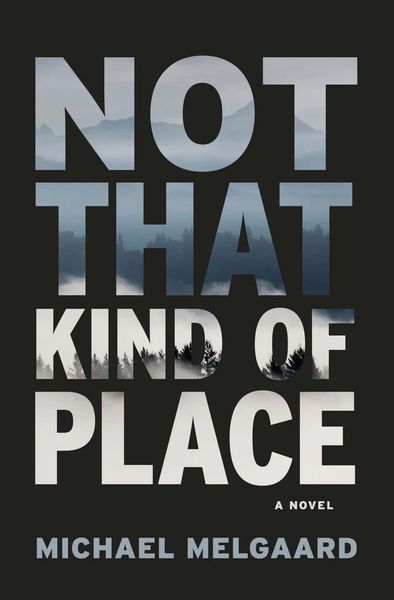Michael Melgaard Delves into the Dark Side of True Crime in His Debut Novel
In many true crime tales, the focus shifts to the intrepid reporter, detective, or armchair expert who is intent on solving a mystery. Or, even more problematically, the story centres—sometimes with breathless fascination—on the perpetrator. But little thought is given to the victims themselves, and especially to those they left behind, who are seen mainly as conduits for information.
In Michael Melgaard's propulsive new novel, Not That Kind of Place (House of Anansi Press), he turns that trope on its head and brings David, the brother of Laura McPherson, the victim of a nationally-covered unsolved murder, to the forefront. Exploring the last impact of Laura's death on those closest to her, Melgaard balances a gripping mystery with a thoughtful and timely deconstruction of the impulse to use real violence as entertainment, delving into what is owed in a quest for truth.
Haunting and atmospheric, Not That Kind of Place explores violence, obsession, community, and family while turning a sharp eye on the true crime genre and its emotional and social landscape.
We're speaking with Melgaard, who made waves with his acclaimed short fiction collection Pallbearing, today about the novel as part of our Long Story interview series. He tells us about drawing on his own childhood in Vancouver Island to craft the book's atmospheric setting, about encountering content by a "whole cottage industry of amateur podcasters" during his research, some of whom had questionable motivations, and about the very valid reason he didn't celebrate finishing the book's final draft.
Open Book:
Do you remember how your first started this novel or the very first bit of writing you did for it?
Michael Melgaard:
I wrote what would end up being the first page of the novel in 2012. I was working a full-time day job and writing short stories when I had time—I thought the page was the start of another story. Over a few months, I made some notes, expanded scenes, and realized it was going to be a novel. I didn’t have the time to focus on something of that length, so I put it aside while I picked away at the stories that would become my first collection, Pallbearing. Once the story collection found a home at House of Anansi, I knew I could justify working on a novel full time, so returned to the notes and scenes I’d started. A lot of it changed over the next few years, of course, but the first page is still more-or-less how I wrote it when the idea first came to me.
OB:
How did you choose the setting of your novel? What connection, if any, did you have to the setting when you began writing?
MM:
The book is set on Vancouver Island, which is where I grew up. The town it’s set in is fictional, but the places in the town are all from my hometown; I needed to write real settings so it felt real to me. The house most of the action takes place in is the house of a girl I went to school with; the diner David, the main character, hangs out at is the one I hung out at when I was young; David has a couple of my old jobs—there’s a lot of that kind of thing. But the town is smaller and a little more remote than the real town, and the layout is entirely different. I suppose I was trying to make it a real-seeming made-up place, kind of like Alice Munro does with her Ontario towns.
OB:
Did the ending of your novel change at all through your drafts? If so, how?
MM:
I had an ending that was pretty consistent through all my drafts—I knew where the main character would end up and how he would feel about all the things that happened, and had written a final scene that got into all that. When I had a decent draft of the whole book, I gave it to a friend and her feedback was very positive except for the end, which she said was like a comedian explaining their joke. “You don’t need to spell it out, we get it,” she said. I had spent a lot of time on the ending and it had been around since the start, so I ignored her. When my editor gave me his first round of notes, wouldn’t you know it, he flagged the whole ending. He was polite about it, but basically said, “We get it. No need to explain the book.” I cut the whole last chapter and reworked the ending into the much better, less explain-y ending it has now.
Your CanLit News
Subscribe to Open Book’s newsletter to get local book events, literary content, writing tips, and more in your inbox
OB:
Did you do any specific research for this novel? Tell us a bit about that process.
MM:
The catalyst of the plot is a reporter showing up to write a true crime, cold case article about the murder of the protagonist’s sister. I listened to a lot of true crime podcasts – not the good, award-winning ones, but the ones where it’s just someone piecing together what they can find on the internet without doing their own research or interviews. I’m amazed by the amount of it that is out there – a whole cottage industry of amateur podcasters dredging up old murders, hoping they’ll be the next Serial or My Favourite Murder or whatever, but expecting they can do that without doing any proper journalism or research. They’re basically reading Wikipedia articles with sound effects added. The more of these podcasts I listened to, the more disgusted I got with how exploitative they were, and so the more the main character of the book became irritated with a reporter showing up to write yet another article about his family’s trauma.
OB:
Did you celebrate finishing your final draft or any other milestones during the writing process? If so, how?
MM:
I know, from long experience, that my final draft isn’t the book’s final draft. I finish it, send it off to friends, they give me some notes and I rework it, then I send it to my editor and he sends it back with notes, and then we do it again and again and then it’s off to copyedit and we do it again. The end of each stage is the start of a new one; it’s exhausting and by the time I signed off on the printer proofs, I didn’t feel much like celebrating. People say writing a novel is like a marathon, and as far as finishing it, I agree. I barely had the energy to throw my hands up crossing the finish line before I wrapped myself in one of those silver blankets and laid on the grass while all my muscles gave up. So, not quite a celebration, but a clear sign I was done. Maybe I’ll feel more like celebrating once the book is actually out? But then, I’m already working on the next thing, so will probably be preoccupied with that.
______________________________________________________________
Michael Melgaard is the author of the short story collection Pallbearing. His writing has appeared in Best Canadian Stories anthology, as well as Joyland, Lithub, and elsewhere. He is a former book columnist for the National Post. Originally from Vancouver Island, he currently lives in Toronto.





